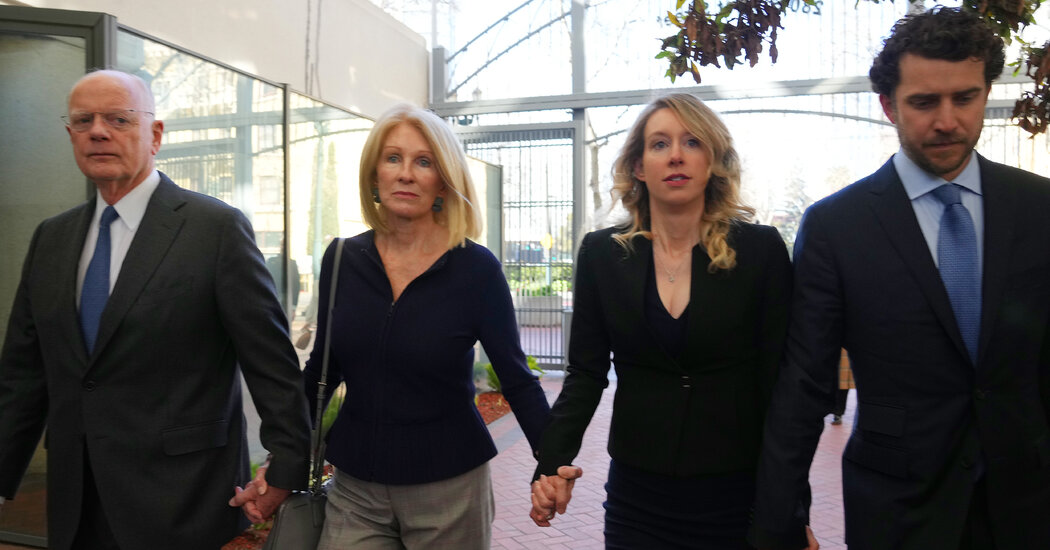Elizabeth Holmes, the disgraced entrepreneur convicted of defrauding investors at her failed blood test startup Theranos, is expected to report to a Texas federal prison on Tuesday to begin her 11-year, three-month sentence.
Ms. Holmes is expected to report to FPC Bryan, a minimum security prison camp for women about 90 minutes from Houston. The 655 inmates are required by the prison manual to work in the cafeteria or in a production facility, where wages start at $1.15 an hour. Before starting work at the factory, Mrs. Holmes may take a test to assess her strengths in areas such as business, administrative, numerical, logical, mechanical and “social.” Inmates can also enroll in a “Lean Six Sigma” training program to learn about efficiency.
“We try to help our ladies find work at the factory that focuses on their strengths so they can develop additional marketable skills,” says the prison handbook.
Ms Holmes, 39, was found guilty of four counts of wire fraud and conspiracy last year for falsely claiming that Theranos’ blood tests could detect a variety of ailments with just a few drops of blood. She and her former business partner, Ramesh Balwani, must jointly pay back $452 million to investors who were defrauded. Ms Holmes has appealed her case, although her requests to stay out of prison during the appeal have been rejected.
Mrs. Holmes founded Theranos in 2003 after she dropped out of Stanford University at the age of 19. The company raised $950 million in funding, making her a billionaire on paper. Theranos collapsed in 2018. Mrs Holmes and Mr Balwani were charged that year.
The pair were tried separately. Mr. Balwani was convicted of 12 counts of fraud and is serving a nearly 13-year sentence at a federal prison in San Pedro, California. He has also appealed his case.
Ms. Holmes’ sentence was meant to send a message to others in Silicon Valley: There are consequences when ambitious start-up founders adopt an ethos known as “fake it till you make it” – when entrepreneurs become ambitious talk about what their companies can do, even if the companies can’t do those things yet – too far. Despite the tech industry’s long history of stretching the rules, as entrepreneurs invent new companies and disrupt old ones, few have ever gone to jail for lying.
Since her conviction, Ms. Holmes has lived in a San Diego rental near the family of Billy Evans, the father of her two children. At her trial, held in San Jose, California, Mrs. Holmes and Mr. Evans lived in a house on the property of Green Gables, a $135 million estate in the wealthy town of Woodside.
Their two young children, William and Invicta, can video call Ms. Holmes and visit her on weekends and federal holidays. Phone calls are limited to 15 minutes each, for a total of 300 minutes per month.
At FPC Bryan, Ms. Holmes, known for wearing black turtlenecks to emulate Steve Jobs while running Theranos, and, at her trial, will sport heels, sheath dresses and a diaper bag, prison-issued khaki pants and shirts in wear pastel green, gray or white with sneakers that cannot be worth more than $100.
She has no internet access, but can buy a radio ($31.75) or mp3 player ($88.40) from the commissary. All music must be “non-explicit,” according to the prison handbook.
FPC Bryan offers leisure activities, according to the handbook, including music programs, “table games” and movies. Arts and crafts are available, including beading, knitting, paper crafts, crochet, and ceramics. A crochet hook costs $1.30 and yarn is $3.55 at FPC Bryan’s Commissioner, according to the handbook.
Inmates have access to an outdoor “recreation garden pavilion” but must return to their dormitories for the person count to take place five times in 24 hours.
Counterfeiting or falsifying documents and running a business is against the rules. Ms. Holmes admitted to falsifying pharmaceutical reports to solicit investors while testifying at her trial.
Other inmates at the prison camp include Jen Shah, a “Real Housewives of Salt Lake City” star who is serving a five-and-a-half-year sentence for telemarketing fraud. In a March blog post about her first few days in prison, Ms. Shah described problems operating the phone system, which uses account numbers, noting that not many people were nice. Breakfast was instant oatmeal, an apple and a slice of wheat bread with jelly, she wrote.
Lea Fastow, a former executive of the collapsed energy company Enron, was jailed for 11 months in the mid-2000s for tax fraud at FPC Bryan. Jenna Ryan, a participant in the January 6 attack on the US Capitol, spent 60 days there. And Michelle Janavs, daughter of Hot Pocket’s co-founder, was jailed for five months for her involvement in the “Operation Varsity Blues” admissions scandal.
Three inmates escaped FPC Bryan in 2017. One of them, Edith Lara, who was serving time on drug charges, has not been found, according to the Bureau of Prisons website.

